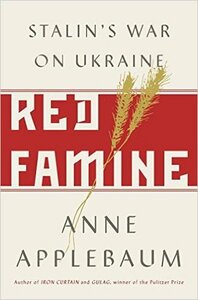Take a photo of a barcode or cover
challenging
dark
tense
slow-paced
dark
informative
slow-paced
I usually don't go for books like this but read it for my Abitur (German high school diploma) as I did a project on the Holodomor and its presentation in media. And BOY this was a tough read!!!! I can say quite confidently that I did not enjoy reading this book. Firstly it is a brick of a book filled with information to its last page which makes it quite hard and exhausting to read and secondly deals with awful contents. However Anne Applebaum did her research so well and actually managed to portray the complex historic events in a relatively accessible way. I've also read a variety of other books on the Holodomor and have to say that it was my favorite- also because it was only published quite recently and contents more accurate information than other books.
However this book is SO important!!! Before reading it I've never heard of the Holodomor let alone its brutality. While working in my project and telling people about it I did not come across a single person who knew what the Holodomor was, I even had to explain it to my history teacher.
So I hope this book gets even more attention that it already got as the Holodomor probably one of the biggest crimes of the 20th century and the education about it is beyond problematic. Please read it!!
However this book is SO important!!! Before reading it I've never heard of the Holodomor let alone its brutality. While working in my project and telling people about it I did not come across a single person who knew what the Holodomor was, I even had to explain it to my history teacher.
So I hope this book gets even more attention that it already got as the Holodomor probably one of the biggest crimes of the 20th century and the education about it is beyond problematic. Please read it!!
Graphic: Animal death, Body horror, Child abuse, Child death, Chronic illness, Death, Genocide, Hate crime, Mental illness, Physical abuse, Rape, Suicide, Torture, Violence, Excrement, Police brutality, Antisemitism, Grief, Cannibalism, Death of parent, Murder, Abandonment, War, Injury/Injury detail
Applebaum does it again. I couldn't put this down.
I posted a more detailed video review/summary on Youtube, check it out at I posted a more detailed video review/summary on Youtube, check it out at https://www.youtube.com/watch?v=USfOZHZEJac if you’re interested. if you’re interested.
Applebaum clearly argues that Soviet policies were not only directly responsible for the Ukrainian famine of 1932 to 1933 or the “Holodomor”, but were an intentionally effort by Stalin and the Soviet leadership to eliminate the political opposition of both Ukrainian nationalists and what they saw as the now-obsolete class of rural peasants. It’s an excellent scholarly work, but probably more detailed than most non-historian readers like myself will need in order to understand what happened in the famine.
Applebaum clearly argues that Soviet policies were not only directly responsible for the Ukrainian famine of 1932 to 1933 or the “Holodomor”, but were an intentionally effort by Stalin and the Soviet leadership to eliminate the political opposition of both Ukrainian nationalists and what they saw as the now-obsolete class of rural peasants. It’s an excellent scholarly work, but probably more detailed than most non-historian readers like myself will need in order to understand what happened in the famine.
Compelling tale of state sponsored famine
Appleby dissects the horrific Ukrainian famine of 1932/3 and its role in destroying Ukrainian national identity. Botched economics, inept bureaucracy and the dogmatic evil of the CPSU led to the death of nearly four million people. Still glossed over by the pathetic and corrupt apologists for Stalinism, this is a warning of the evils of unaccountable power.
Appleby dissects the horrific Ukrainian famine of 1932/3 and its role in destroying Ukrainian national identity. Botched economics, inept bureaucracy and the dogmatic evil of the CPSU led to the death of nearly four million people. Still glossed over by the pathetic and corrupt apologists for Stalinism, this is a warning of the evils of unaccountable power.
For decades, knowledge of the Holodomor was suppressed or dismissed as a hoax. In Red Famine: Stalin’s War on Ukraine, 1921-1933, Pulitzer Prize-winning author Anna Applebaum was able to take newly available archival and oral material and build on the work of previous scholars’ work to create a throughout history of what Sovietization did to Ukraine. It is a harrowing read because all of the suffering and death could have been avoided if Stalin had bowed to reality and reversed his impossible grain policies...
Read the rest of my review at A Bookish Type. I received a free copy of this book from the publisher via NetGalley for review consideration.
Read the rest of my review at A Bookish Type. I received a free copy of this book from the publisher via NetGalley for review consideration.
The only reasons I can think of as to why this book has such high reviews is it’s neoliberal privileged perspective, pin point focus on Ukraine and Ukraine alone and rigid news journalism language, otherwise this book would be seen as the mediocre retelling of events that it is. The book has cultural and political blinders on, as though these sorts of events never happened in the West before or since. Its laser focus on Ukraine is either unknowingly or purposefully ignorant to outside events that the reader could use as reference and bring more life to the language, there is only one reference to events outside of Ukraine that the reader would know of to draw reference from.
The language is horrifically stiff and strains under the author’s unwillingness or inability to engage with the ideology, and as such confuses private property with personal property and ends up making the case for communism for anyone who is familiar with ideology, which isn’t a bad thing it just seems unintended and amateur. They mischaracterise Marxism and communism as death cults where the ideologies were twisted to fit the regime, which comes across as either ideologically malicious or simply status quo complacency, and as such lends the book an inherently neoliberal bent. The use of exact numbers is useless and simply makes it harder to read as there are a lot of numbers, which comes off as more pedantic than an effort to be accurate.
There is an obvious amount of extensive research made in order to write this book and keep the details of the events accurate, but with that being said the author obviously did no research outside of their interest. There is a point in the book where a discussion with a doctor or psychologist/psychiatrist would have been useful and would have bolstered personal accounts but was not made. Additionally, the author gets a wide range of information grossly wrong about the events of Chernobyl, mostly to advance their anti-soviet views, which are justified just inaccurate in this instance.
The way the author recounts events comes off as rather juvenile and removes anything besides a skin deep reading of individual accounts. It sounds more like a high school history report at times than the writings of an award winner.
However, my biggest problem with this book is how often the author repeats themselves. It’s not just a nudge to remind you of something mentioned a few chapters previously, no it’s repeated statements, sentences and whole quotes paragraphs after they were first stated not a page previously. It is infuriating to have my memory questioned by a book so short and stark that it’s difficult to forget what’s already been written. If I didn’t already have issues with the book, these repetitions would have simply made the book as a whole irritating instead of aggravating.
This reads more like a second or third draft than a finished product and has no clear ideology or focus, thank god it’s only 360 (rounded number) pages long. It's such a shame because the events are truly interesting and the author's only issues are ideology and repetition, while their style is hampered by their insistence to be journalistic. All in all this book is a short disappointment that I am glad to put behind me.
The language is horrifically stiff and strains under the author’s unwillingness or inability to engage with the ideology, and as such confuses private property with personal property and ends up making the case for communism for anyone who is familiar with ideology, which isn’t a bad thing it just seems unintended and amateur. They mischaracterise Marxism and communism as death cults where the ideologies were twisted to fit the regime, which comes across as either ideologically malicious or simply status quo complacency, and as such lends the book an inherently neoliberal bent. The use of exact numbers is useless and simply makes it harder to read as there are a lot of numbers, which comes off as more pedantic than an effort to be accurate.
There is an obvious amount of extensive research made in order to write this book and keep the details of the events accurate, but with that being said the author obviously did no research outside of their interest. There is a point in the book where a discussion with a doctor or psychologist/psychiatrist would have been useful and would have bolstered personal accounts but was not made. Additionally, the author gets a wide range of information grossly wrong about the events of Chernobyl, mostly to advance their anti-soviet views, which are justified just inaccurate in this instance.
The way the author recounts events comes off as rather juvenile and removes anything besides a skin deep reading of individual accounts. It sounds more like a high school history report at times than the writings of an award winner.
However, my biggest problem with this book is how often the author repeats themselves. It’s not just a nudge to remind you of something mentioned a few chapters previously, no it’s repeated statements, sentences and whole quotes paragraphs after they were first stated not a page previously. It is infuriating to have my memory questioned by a book so short and stark that it’s difficult to forget what’s already been written. If I didn’t already have issues with the book, these repetitions would have simply made the book as a whole irritating instead of aggravating.
This reads more like a second or third draft than a finished product and has no clear ideology or focus, thank god it’s only 360 (rounded number) pages long. It's such a shame because the events are truly interesting and the author's only issues are ideology and repetition, while their style is hampered by their insistence to be journalistic. All in all this book is a short disappointment that I am glad to put behind me.
i’ve never written a review for a truly non-fiction historical novel but i can’t imagine many coming close to “red famine.” everything applebaum explains ties together and a cohesive historical narrative is formed that helps us understand the complicated politics of eastern europe and russia today. just phenomenal. i feel very smart after finishing it, which is how i think one should feel after reading a pulitzer prize-winning non-fiction novel.





